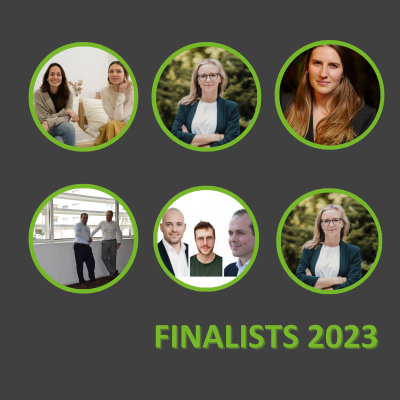
Startups for the Future: These are our finalists
These six startups are nominated for the 2023 Green Alley Award and they are going to boost the circular economy.
Every year, the Green Alley Award event takes place with an important mission to spread: to encourage and to support the circular economy. We do so by fostering the ideas and solutions of new startups that are tackling global challenges like waste, plastic pollution, and ethical working conditions. The Green Alley Award returns once again to Haus Ungarn in Berlin and will present Europe’s best Circular Economy business ideas live on stage.
During this event two important factors will play an important role: innovation and inspiration. The first refers to the inventiveness of these startups, new technology and the ways of adding value to their ideas and products. The latter refers to the hope of stimulating the minds, feelings and creativity of innovators and entrepreneurs alike, to make substantial changes in our society and to stop environmental pollution, prevent climate change and finally save this planet.
Global challenges, like climate change, pollution and littering can seem overwhelming but there can be some pragmatic solutions and they usually begin with an idea. This year´s six Green Alley Award finalist’s great ideas are coming from Sweden, Ukraine, Portugal, Spain, the Netherlands, and Estonia. From circular textiles and sustainable packaging to biodegradable EPS, these startups are addressing vital topics:
BCome (Spain)
The fashion industry has a waste problem that needs to be addressed: fast fashion, which is the turnover of cheap and mass-produced-clothing. And here comes BCome into play: They have developed a digital platform for the management of sustainability in the textile and apparel industry and to enable brands to build more responsible supply chains and ensure transparency for their final customers.
Circulate (Sweden)
As the European Green Deal moves forward, aiming to make all packaging recyclable by 2030, the demand for sustainable packaging will also rise. Support comes from Sweden: company helps small and medium sized businesses navigate the sustainable packaging market! Circulate offers a digital sourcing platform and marketplace for sustainable packaging solutions that makes finding, comparing, and implementing better packaging less complex and more transparent.
S.Lab (Ukraine)
EPS – Expanded Polystyrene Styrofoam – is a classic among the materials used for efficient construction or shock absorption and moisture insensitive packaging of products. Despite many advantages, this material has also downsides: The Ukrainian startup S.Lab developed an alternative to EPS material and a truly green packaging solution! Made from mushroom roots and hemp stems, their packaging is therefore 100% biodegradable and waterproof.
Simby (Portugal)
The amount of electronical and electronic waste generated every year in the EU is increasing rapidly. It is now one of the fastest growing waste streams. The Portuguese startup Simby will now change this game with their solution. The digital WEEE (Waste Electrical and Electronic Equipment) marketplace connects suitable business partners using digital technology and machine learning and allows individuals and businesses to sell their unwanted or end-of-life electronic.
Takatari (Estonia)
Workers picking up waste from streets, dump sites or landfills in many countries of the Global South are more than needed in a society, they are in fact are indispensable. The Estonian startup Takatari aims at connecting the informal waste pickers with the global circular economy to solve two problems at once: the problem of poverty and exclusion of the pickers as well as the problem of plastic pollution.
Veridis (The Netherlands)
There is no such thing as just one type of plastic. Even though we are usually in contact with the most common types of plastic, like PET, PP, PS or HDPE, there are hundreds of other types of plastic differing in composition and material properties. The good news is: the Dutch startup Veridis developed a material analysis technology for plastic composition at bulk level. Their technology claims a huge advantage: revolutionising (recycled) plastic quality control by scaling up sample sizes with a factor 100.000.
Would you like to meet these startups and experience the award ceremony live in Berlin? Register now for the event here